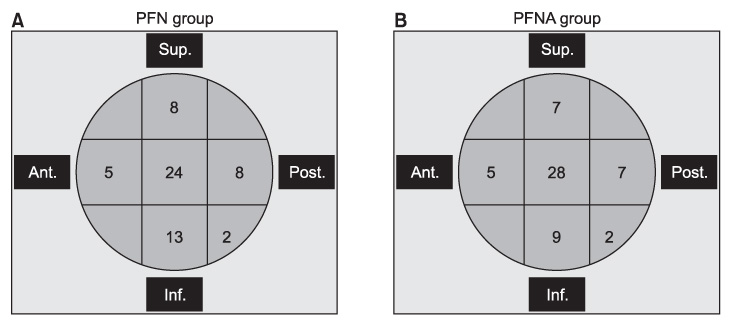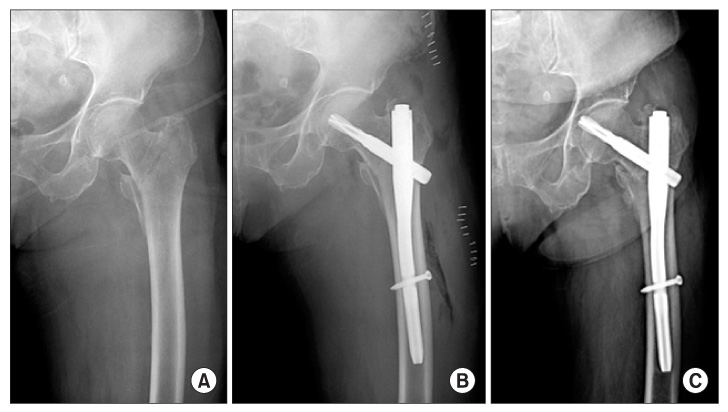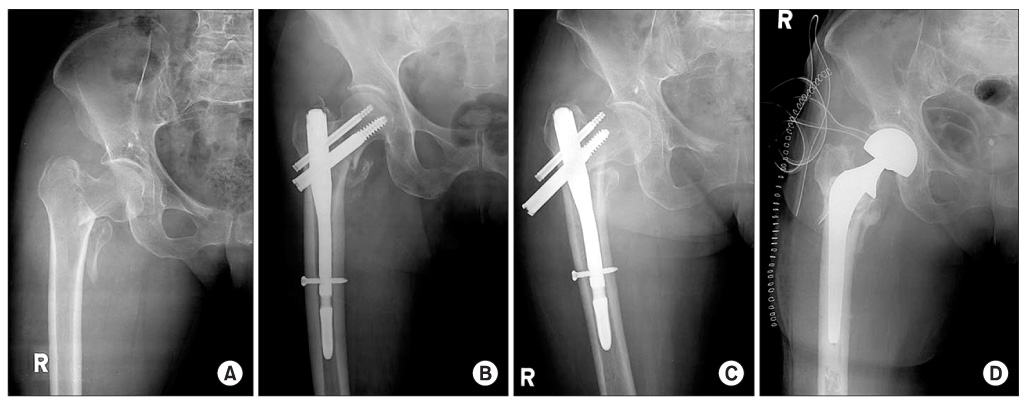J Korean Orthop Assoc.
2011 Oct;46(5):392-398.
Proximal Femoral Nail Antirotation and Proximal Femoral Nail in Intertrochanteric Fractures
- Affiliations
-
- 1Department of Orthopedic Surgery, Dong-A University, Busan, Korea.
- 2Centum Hospital, Busan, Korea. rosita96@naver.com
Abstract
- PURPOSE
The purpose of this study was to compare the curative effect of Proximal Femoral Nail Antirotation (PFNA) with a Proximal Femoral Nail (PFN) for the treatment of intertrochanteric fracture of the femur.
MATERIALS AND METHODS
This study compared 58 cases of 57 patients who were treated by PFNA from June 2007 to February 2009 with 60 cases of 58 patients who were treated by PFN from July 2005 to May 2007. The mean duration of follow-up was 17.2 months (range: 12-31 months). All the fractures were classified according to the AO/ASIF systems. The operative time, the average number of days of hospitalization, the amount of bleeding, the incidence of complications, the union time as assessed on radiologic examinations, the tip apex distance (TAD), the outcome according to the Cleveland index, the change of the neck shaft angle and the amount of sliding at the end of follow-up were compared between the two groups. The clinical outcomes were compared according to the mobility score of Parker, Palmer, Jensen. The results were analyzed using the Student T-test and chi-square tests.
RESULTS
There was no significant difference in blood loss during surgery, the number of hospitalization days, radiographic bone union and TAD (p>0.05). Compared with PFN, the operation time, the postoperative sliding and the neck shaft angle change were significantly less in the PFNA group (p<0.05). For the postoperative complications, there was 1 case of cutting out and 1 case of superficial infection in the PFNA group, and there were 4 cases of cutting out, 2 cases of back out, 2 cases of varus collapse, 1 case of nonunion and 1 case of superficial infection in the PFN group.
CONCLUSION
Using the PFNA had relatively satisfying clinical results for the treatment of intertrochanteric fracture, as compared with those of using PFN.
MeSH Terms
Figure
Reference
-
1. Hornby R, Evans JG, Vardon V. Operative or conservative treatment for trochanteric fractures of the femur. A randomised epidemiological trial in elderly patients. J Bone Joint Surg Br. 1989. 71:619–623.
Article2. Kyle RF, Cabanela ME, Russell TA, et al. Fractures of the proximal part of the femur. Instr Course Lect. 1995. 44:227–253.
Article3. Adams CI, Robinson CM, Court-Brown CM, McQueen MM. Prospective randomized controlled trial of an intramedullary nail versus dynamic screw and plate for intertrochanteric fractures of the femur. J Orthop Trauma. 2001. 15:394–400.
Article4. Al-yassari G, Langstaff RJ, Jones JW, Al-Lami M. The AO/ASIF proximal femoral nail (PFN) for the treatment of unstable trochanteric femoral fracture. Injury. 2002. 33:395–399.
Article5. Yoo JH, Park JS, Noh KC, et al. The results of proximal femoral nail antirotation: a comparative study with proximal femoral nail. J Korean Hip Soc. 2008. 20:286–292.
Article6. Cleveland M, Bosworth DM, Thompson FR, Wilson HJ Jr, Ishizuka T. A ten-year analysis of intertrochanteric fracture of the femur. J Bone Joint Surg Am. 1959. 41:1399–1408.7. Baumgaertner MR, Curtin SL, Lindskog DM, Keggi JM. The value of the tip-apex distance in predicting failure of fixation of peritrochanteric fractures of the hip. J Bone Joint Surg Am. 1995. 77:1058–1064.
Article8. Jensen JS. Determining factors for the mortality following hip fractures. Injury. 1984. 15:411–414.
Article9. Parker MJ, Palmer CR. A new mobility score for predicting mortality after hip fracture. J Bone Joint Surg Br. 1993. 75:797–798.
Article10. Choo SK, Oh HK, Choi JY. PFNA and PFN in intertrochanteric fractures: comparison study of sliding. J Korean Hip Soc. 2010. 22:79–85.11. Radford PJ, Needoff M, Webb JK. A prospective randomised comparison of the dynamic hip screw and the gamma locking nail. J Bone Joint Surg Br. 1993. 75:789–793.
Article12. Hardy DC, Descamps PY, Krallis P, et al. Use of an intramedullary hip-screw compared with a compression hip-screw with a plate for intertrochanteric femoral fractures. A prospective, randomized study of one hundred patients. J Bone Joint Surg Am. 1998. 80:618–630.
Article13. Kyle RF, Wright TM, Burstein AH. Biomechanical analysis of the sliding characteristics of compression hip screws. J Bone Joint Surg Am. 1980. 62:1308–1314.
Article14. Curtis MJ, Jinnah RH, Wilson V, Cunningham BW. Proximal femoral fractures: a biomechanical study to compare intramedullary and extramedullary fixation. Injury. 1994. 25:99–104.
Article15. Davis TR, Sher JL, Horsman A, Simpson M, Porter BB, Checketts RG. Intertrochanteric femoral fractures. Mechanical failure after internal fixation. J Bone Joint Surg Br. 1990. 72:26–31.
Article16. Kim WY, Han CH, Park JI, Kim JY. Failure of intertrochanteric fracture fixation with a dynamic hip screw in relation to pre-operative fracture stability and osteoporosis. Int Orthop. 2001. 25:360–362.
Article17. Butt MS, Krikler SJ, Nafie S, Ali MS. Comparison of dynamic hip screw and gamma nail: a prospective, randomized, controlled trial. Injury. 1995. 26:615–618.
Article18. Chevalley F, Gamba D. Gamma nailing of pertrochanteric and subtrochanteric fractures: clinical results of a series of 63 consecutive cases. J Orthop Trauma. 1997. 11:412–415.
Article19. Seinsheimer F. Subtrochanteric fractures of the femur. J Bone Joint Surg Am. 1978. 60:300–306.
Article20. Boldin C, Seibert FJ, Fankhauser F, Peicha G, Grechenig W, Szyszkowitz R. The proximal femoral nail (PFN)--a minimal invasive treatment of unstable proximal femoral fractures: a prospective study of 55 patients with a follow-up of 15 months. Acta Orthop Scand. 2003. 74:53–58.21. Ahn SJ, Park JH. Proximal Femoral Nail (PFN) for the treatment of the femoral trochanteric fracture. J Korean Fract Soc. 2004. 17:7–12.
Article22. Kim YS, Yoon JW, Han SK. Treatment of intertrochanteric fracture of the femur using a dyna locking trochanteric (DLT) Nail. J Korean Hip Soc. 2010. 22:216–221.
Article23. Moon YW, Suh DH, Kang ST, Kwon DJ, Ji YN, Lee KB. The proximal femoral nail for intertrochanteric fracture of the femur. J Korean Soc Fract. 2003. 16:29–36.
Article24. Papasimos S, Koutsojannis CM, Panagopoulos A, Megas P, Lambiris E. A randomised comparison of AMBI, TGN and PFN for treatment of unstable trochanteric fractures. Arch Orthop Trauma Surg. 2005. 125:462–468.
Article25. Strauss E, Frank J, Lee J, Kummer FJ, Tejwani N. Helical blade versus sliding hip screw for treatment of unstable intertrochanteric hip fractures: a biomechanical evaluation. Injury. 2006. 37:984–989.
Article26. Ito K, Hungerbühler R, Wahl D, Grass R. Improved intramedullary nail interlocking in osteoporotic bone. J Orthop Trauma. 2001. 15:192–196.
Article
- Full Text Links
- Actions
-
Cited
- CITED
-
- Close
- Share
- Similar articles
-
- Treatment of Femoral Intertrochanteric Fracture with Proximal Femoral Nail
- Radiographic Outcomes of Osteosynthesis Using Proximal Femoral Nail Antirotation (PFNA) System in Intertrochanteric Femoral Fracture: Has PFNA II Solved All the Problems?
- Excessive Sliding of the Helical Blade and the Femoral Neck Fracture after Insertion of Proximal Femoral Nail Anti-Rotation for Type A2 Intertrochanteric Fractures - A Case Report -
- Comparative Study of Proximal Femoral Nail Antirotation and Zimmer Natural Nail for the Treatment of Stable Intertrochanteric Fractures
- Comparative Study of Intertrochanteric Fracture Treated with the Proximal Femoral Nail Anti-Rotation and the Third Generation of Gamma Nail




